
|
Detailed Description
Mutexes related APIs and services.
Operation mode
A mutex is a threads synchronization object that can be in two distinct states:
- Not owned (unlocked).
- Owned by a thread (locked).
Operations defined for mutexes:
- Lock: The mutex is checked, if the mutex is not owned by some other thread then it is associated to the locking thread else the thread is queued on the mutex in a list ordered by priority.
- Unlock: The mutex is released by the owner and the highest priority thread waiting in the queue, if any, is resumed and made owner of the mutex.
Constraints
In ChibiOS/RT the Unlock operations must always be performed in lock-reverse order. This restriction both improves the performance and is required for an efficient implementation of the priority inheritance mechanism.
Operating under this restriction also ensures that deadlocks are no possible.
Recursive mode
By default mutexes are not recursive, this mean that it is not possible to take a mutex already owned by the same thread. It is possible to enable the recursive behavior by enabling the option CH_CFG_USE_MUTEXES_RECURSIVE.
The priority inversion problem
The mutexes in ChibiOS/RT implements the full priority inheritance mechanism in order handle the priority inversion problem.
When a thread is queued on a mutex, any thread, directly or indirectly, holding the mutex gains the same priority of the waiting thread (if their priority was not already equal or higher). The mechanism works with any number of nested mutexes and any number of involved threads. The algorithm complexity (worst case) is N with N equal to the number of nested mutexes.
- Precondition
- In order to use the mutex APIs the
CH_CFG_USE_MUTEXESoption must be enabled inchconf.h.
- Postcondition
- Enabling mutexes requires 5-12 (depending on the architecture) extra bytes in the
thread_tstructure.
Macros | |
| #define | _MUTEX_DATA(name) {_THREADS_QUEUE_DATA(name.queue), NULL, NULL, 0} |
| Data part of a static mutex initializer. More... | |
| #define | MUTEX_DECL(name) mutex_t name = _MUTEX_DATA(name) |
| Static mutex initializer. More... | |
Typedefs | |
| typedef struct ch_mutex | mutex_t |
| Type of a mutex structure. More... | |
Data Structures | |
| struct | ch_mutex |
| Mutex structure. More... | |
Functions | |
| void | chMtxObjectInit (mutex_t *mp) |
Initializes s mutex_t structure. More... | |
| void | chMtxLock (mutex_t *mp) |
| Locks the specified mutex. More... | |
| void | chMtxLockS (mutex_t *mp) |
| Locks the specified mutex. More... | |
| bool | chMtxTryLock (mutex_t *mp) |
| Tries to lock a mutex. More... | |
| bool | chMtxTryLockS (mutex_t *mp) |
| Tries to lock a mutex. More... | |
| void | chMtxUnlock (mutex_t *mp) |
| Unlocks the specified mutex. More... | |
| void | chMtxUnlockS (mutex_t *mp) |
| Unlocks the specified mutex. More... | |
| void | chMtxUnlockAllS (void) |
| Unlocks all mutexes owned by the invoking thread. More... | |
| void | chMtxUnlockAll (void) |
| Unlocks all mutexes owned by the invoking thread. More... | |
| static bool | chMtxQueueNotEmptyS (mutex_t *mp) |
Returns true if the mutex queue contains at least a waiting thread. More... | |
| static mutex_t * | chMtxGetNextMutexS (void) |
| Returns the next mutex in the mutexes stack of the current thread. More... | |
Macro Definition Documentation
| #define _MUTEX_DATA | ( | name | ) | {_THREADS_QUEUE_DATA(name.queue), NULL, NULL, 0} |
| #define MUTEX_DECL | ( | name | ) | mutex_t name = _MUTEX_DATA(name) |
Typedef Documentation
Function Documentation
| void chMtxObjectInit | ( | mutex_t * | mp | ) |
Initializes s mutex_t structure.
- Parameters
-
[out] mp pointer to a mutex_tstructure
- Function Class:
- Initializer, this function just initializes an object and can be invoked before the kernel is initialized.
Definition at line 103 of file chmtx.c.
References chDbgCheck, ch_mutex::cnt, ch_mutex::owner, ch_mutex::queue, and queue_init().
Referenced by _factory_init(), _heap_init(), and chHeapObjectInit().

| void chMtxLock | ( | mutex_t * | mp | ) |
Locks the specified mutex.
- Postcondition
- The mutex is locked and inserted in the per-thread stack of owned mutexes.
- Parameters
-
[in] mp pointer to the mutex_tstructure
- Function Class:
- Normal API, this function can be invoked by regular system threads but not from within a lock zone.
Definition at line 123 of file chmtx.c.
References chMtxLockS(), chSysLock(), and chSysUnlock().

| void chMtxLockS | ( | mutex_t * | mp | ) |
Locks the specified mutex.
- Postcondition
- The mutex is locked and inserted in the per-thread stack of owned mutexes.
- Parameters
-
[in] mp pointer to the mutex_tstructure
- Function Class:
- This is an S-Class API, this function can be invoked from within a system lock zone by threads only.
Definition at line 139 of file chmtx.c.
References CH_STATE_CURRENT, CH_STATE_READY, CH_STATE_SNDMSGQ, CH_STATE_WTCOND, CH_STATE_WTMTX, CH_STATE_WTSEM, chDbgAssert, chDbgCheck, chDbgCheckClassS(), chSchGoSleepS(), chSchReadyI(), ch_mutex::cnt, currp, ch_thread::mtxlist, ch_mutex::next, ch_mutex::owner, ch_thread::prio, ch_mutex::queue, queue_dequeue(), queue_prio_insert(), ch_thread::state, ch_thread::u, and ch_thread::wtmtxp.
Referenced by chCondWaitS(), chCondWaitTimeoutS(), and chMtxLock().
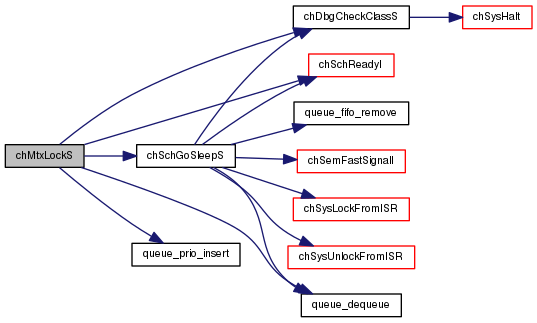
| bool chMtxTryLock | ( | mutex_t * | mp | ) |
Tries to lock a mutex.
This function attempts to lock a mutex, if the mutex is already locked by another thread then the function exits without waiting.
- Postcondition
- The mutex is locked and inserted in the per-thread stack of owned mutexes.
- Note
- This function does not have any overhead related to the priority inheritance mechanism because it does not try to enter a sleep state.
- Parameters
-
[in] mp pointer to the mutex_tstructure
- Returns
- The operation status.
- Return values
-
true if the mutex has been successfully acquired false if the lock attempt failed.
- Function Class:
- Normal API, this function can be invoked by regular system threads but not from within a lock zone.
Definition at line 255 of file chmtx.c.
References chMtxTryLockS(), chSysLock(), and chSysUnlock().
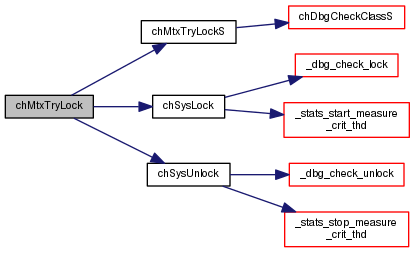
| bool chMtxTryLockS | ( | mutex_t * | mp | ) |
Tries to lock a mutex.
This function attempts to lock a mutex, if the mutex is already taken by another thread then the function exits without waiting.
- Postcondition
- The mutex is locked and inserted in the per-thread stack of owned mutexes.
- Note
- This function does not have any overhead related to the priority inheritance mechanism because it does not try to enter a sleep state.
- Parameters
-
[in] mp pointer to the mutex_tstructure
- Returns
- The operation status.
- Return values
-
true if the mutex has been successfully acquired false if the lock attempt failed.
- Function Class:
- This is an S-Class API, this function can be invoked from within a system lock zone by threads only.
Definition at line 282 of file chmtx.c.
References chDbgAssert, chDbgCheck, chDbgCheckClassS(), ch_mutex::cnt, currp, ch_mutex::next, and ch_mutex::owner.
Referenced by chMtxTryLock().

| void chMtxUnlock | ( | mutex_t * | mp | ) |
Unlocks the specified mutex.
- Note
- Mutexes must be unlocked in reverse lock order. Violating this rules will result in a panic if assertions are enabled.
- Precondition
- The invoking thread must have at least one owned mutex.
- Postcondition
- The mutex is unlocked and removed from the per-thread stack of owned mutexes.
- Parameters
-
[in] mp pointer to the mutex_tstructure
- Function Class:
- Normal API, this function can be invoked by regular system threads but not from within a lock zone.
Definition at line 323 of file chmtx.c.
References chDbgAssert, chDbgCheck, chMtxQueueNotEmptyS(), chSchReadyI(), chSchRescheduleS(), chSysLock(), chSysUnlock(), ch_mutex::cnt, currp, ch_thread::mtxlist, ch_mutex::next, ch_threads_queue::next, ch_mutex::owner, ch_thread::prio, ch_mutex::queue, queue_fifo_remove(), and ch_thread::realprio.
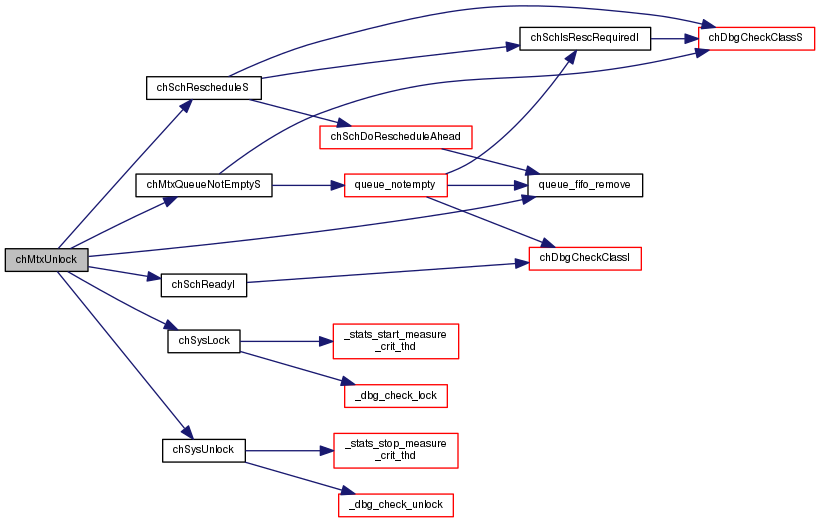
| void chMtxUnlockS | ( | mutex_t * | mp | ) |
Unlocks the specified mutex.
- Note
- Mutexes must be unlocked in reverse lock order. Violating this rules will result in a panic if assertions are enabled.
- Precondition
- The invoking thread must have at least one owned mutex.
- Postcondition
- The mutex is unlocked and removed from the per-thread stack of owned mutexes.
- This function does not reschedule so a call to a rescheduling function must be performed before unlocking the kernel.
- Parameters
-
[in] mp pointer to the mutex_tstructure
- Function Class:
- This is an S-Class API, this function can be invoked from within a system lock zone by threads only.
Definition at line 410 of file chmtx.c.
References chDbgAssert, chDbgCheck, chDbgCheckClassS(), chMtxQueueNotEmptyS(), chSchReadyI(), ch_mutex::cnt, currp, ch_thread::mtxlist, ch_mutex::next, ch_threads_queue::next, ch_mutex::owner, ch_thread::prio, ch_mutex::queue, queue_fifo_remove(), and ch_thread::realprio.
Referenced by chCondWaitS(), and chCondWaitTimeoutS().

| void chMtxUnlockAllS | ( | void | ) |
Unlocks all mutexes owned by the invoking thread.
- Postcondition
- The stack of owned mutexes is emptied and all the found mutexes are unlocked.
- This function does not reschedule so a call to a rescheduling function must be performed before unlocking the kernel.
- Note
- This function is MUCH MORE efficient than releasing the mutexes one by one and not just because the call overhead, this function does not have any overhead related to the priority inheritance mechanism.
- Function Class:
- This is an S-Class API, this function can be invoked from within a system lock zone by threads only.
Definition at line 487 of file chmtx.c.
References chMtxQueueNotEmptyS(), chSchReadyI(), ch_mutex::cnt, currp, ch_thread::mtxlist, ch_mutex::next, ch_mutex::owner, ch_thread::prio, ch_mutex::queue, queue_fifo_remove(), and ch_thread::realprio.

| void chMtxUnlockAll | ( | void | ) |
Unlocks all mutexes owned by the invoking thread.
- Postcondition
- The stack of owned mutexes is emptied and all the found mutexes are unlocked.
- Note
- This function is MUCH MORE efficient than releasing the mutexes one by one and not just because the call overhead, this function does not have any overhead related to the priority inheritance mechanism.
- Function Class:
- Normal API, this function can be invoked by regular system threads but not from within a lock zone.
Definition at line 524 of file chmtx.c.
References chMtxQueueNotEmptyS(), chSchReadyI(), chSchRescheduleS(), chSysLock(), chSysUnlock(), ch_mutex::cnt, currp, ch_thread::mtxlist, ch_mutex::next, ch_mutex::owner, ch_thread::prio, ch_mutex::queue, queue_fifo_remove(), and ch_thread::realprio.
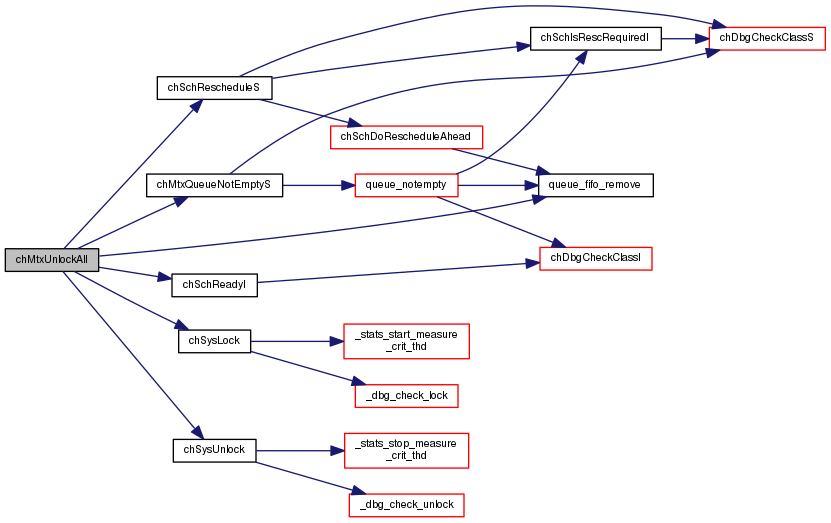
|
inlinestatic |
Returns true if the mutex queue contains at least a waiting thread.
- Parameters
-
[out] mp pointer to a mutex_tstructure
- Returns
- The mutex queue status.
- Function Class:
- This is an S-Class API, this function can be invoked from within a system lock zone by threads only.
Definition at line 129 of file chmtx.h.
References chDbgCheckClassS(), ch_mutex::queue, and queue_notempty().
Referenced by chMtxUnlock(), chMtxUnlockAll(), chMtxUnlockAllS(), and chMtxUnlockS().
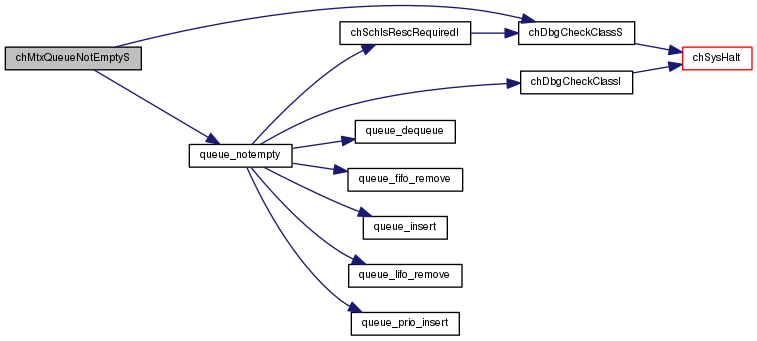
|
inlinestatic |
Returns the next mutex in the mutexes stack of the current thread.
- Returns
- A pointer to the next mutex in the stack.
- Return values
-
NULL if the stack is empty.
- Function Class:
- This is an S-Class API, this function can be invoked from within a system lock zone by threads only.
Definition at line 144 of file chmtx.h.
References chThdGetSelfX(), and ch_thread::mtxlist.
Referenced by chCondWaitS(), and chCondWaitTimeoutS().

